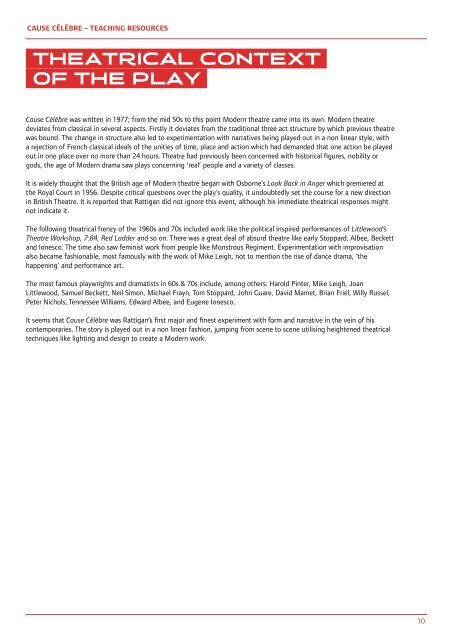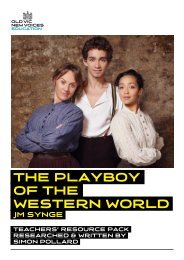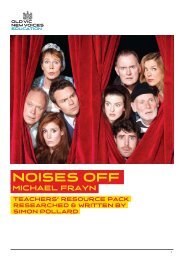Cause Celebre - IdeasTap
Cause Celebre - IdeasTap
Cause Celebre - IdeasTap
Create successful ePaper yourself
Turn your PDF publications into a flip-book with our unique Google optimized e-Paper software.
CAUSE CélèBRE – TEACHINg RESOURCES<br />
Theatrical Context<br />
of the PlaY<br />
<strong>Cause</strong> Célèbre was written in 1977; from the mid 50s to this point Modern theatre came into its own. Modern theatre<br />
deviates from classical in several aspects. Firstly it deviates from the traditional three act structure by which previous theatre<br />
was bound. The change in structure also led to experimentation with narratives being played out in a non linear style, with<br />
a rejection of French classical ideals of the unities of time, place and action which had demanded that one action be played<br />
out in one place over no more than 24 hours. Theatre had previously been concerned with historical figures, nobility or<br />
gods, the age of Modern drama saw plays concerning ‘real’ people and a variety of classes.<br />
It is widely thought that the British age of Modern theatre began with Osborne’s Look Back in Anger which premiered at<br />
the Royal Court in 1956. Despite critical questions over the play’s quality, it undoubtedly set the course for a new direction<br />
in British Theatre. It is reported that Rattigan did not ignore this event, although his immediate theatrical responses might<br />
not indicate it.<br />
The following theatrical frenzy of the 1960s and 70s included work like the political inspired performances of Littlewood’s<br />
Theatre Workshop, 7:84, Red Ladder and so on. There was a great deal of absurd theatre like early Stoppard, Albee, Beckett<br />
and Ionesco. The time also saw feminist work from people like Monstrous Regiment. Experimentation with improvisation<br />
also became fashionable, most famously with the work of Mike Leigh, not to mention the rise of dance drama, ‘the<br />
happening’ and performance art.<br />
The most famous playwrights and dramatists in 60s & 70s include, among others: Harold Pinter, Mike Leigh, Joan<br />
Littlewood, Samuel Beckett, Neil Simon, Michael Frayn, Tom Stoppard, John Guare, David Mamet, Brian Friel, Willy Russel,<br />
Peter Nichols, Tennessee Williams, Edward Albee, and Eugene Ionesco.<br />
It seems that <strong>Cause</strong> Célèbre was Rattigan’s first major and finest experiment with form and narrative in the vein of his<br />
contemporaries. The story is played out in a non linear fashion, jumping from scene to scene utilising heightened theatrical<br />
techniques like lighting and design to create a Modern work.<br />
10









